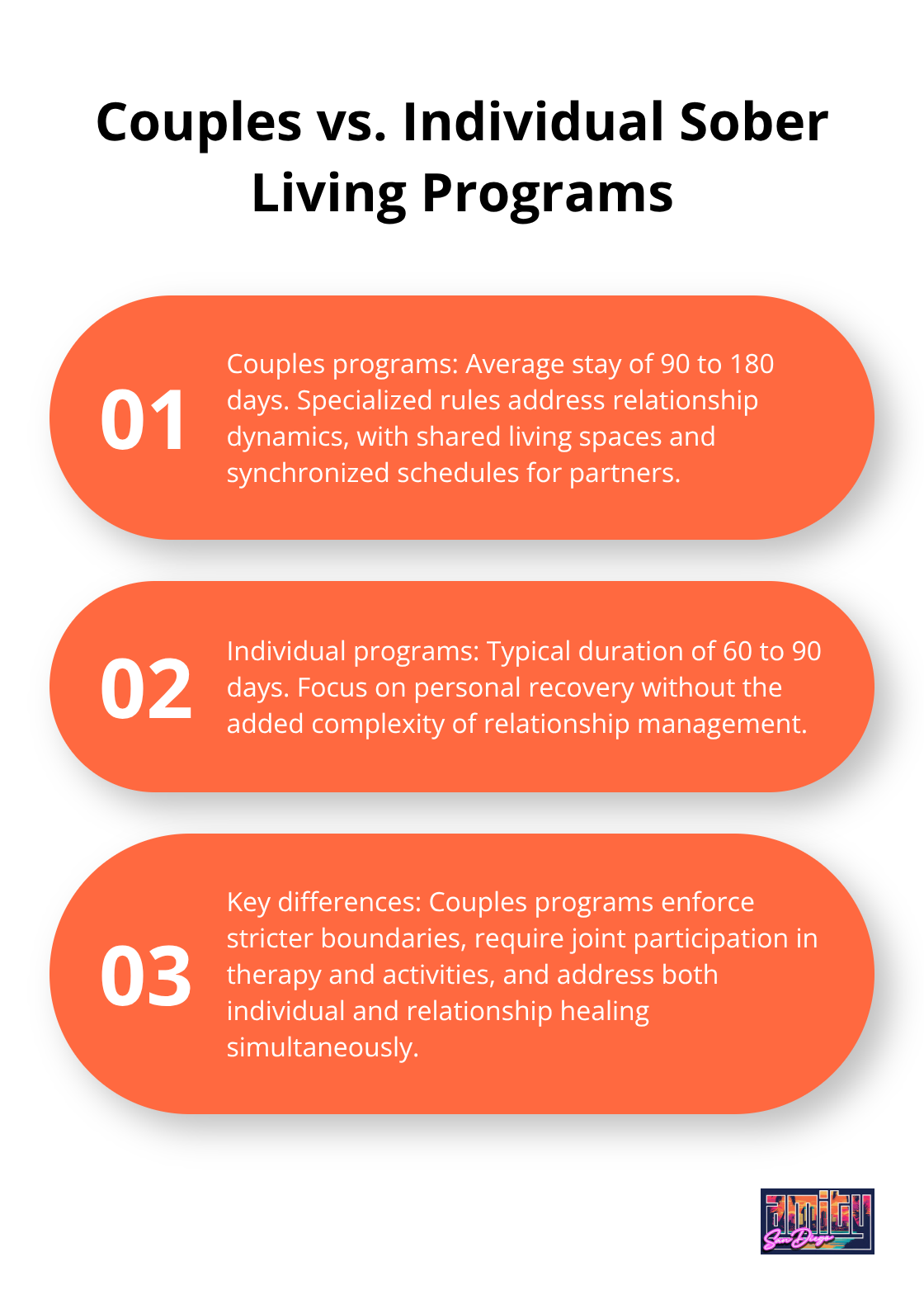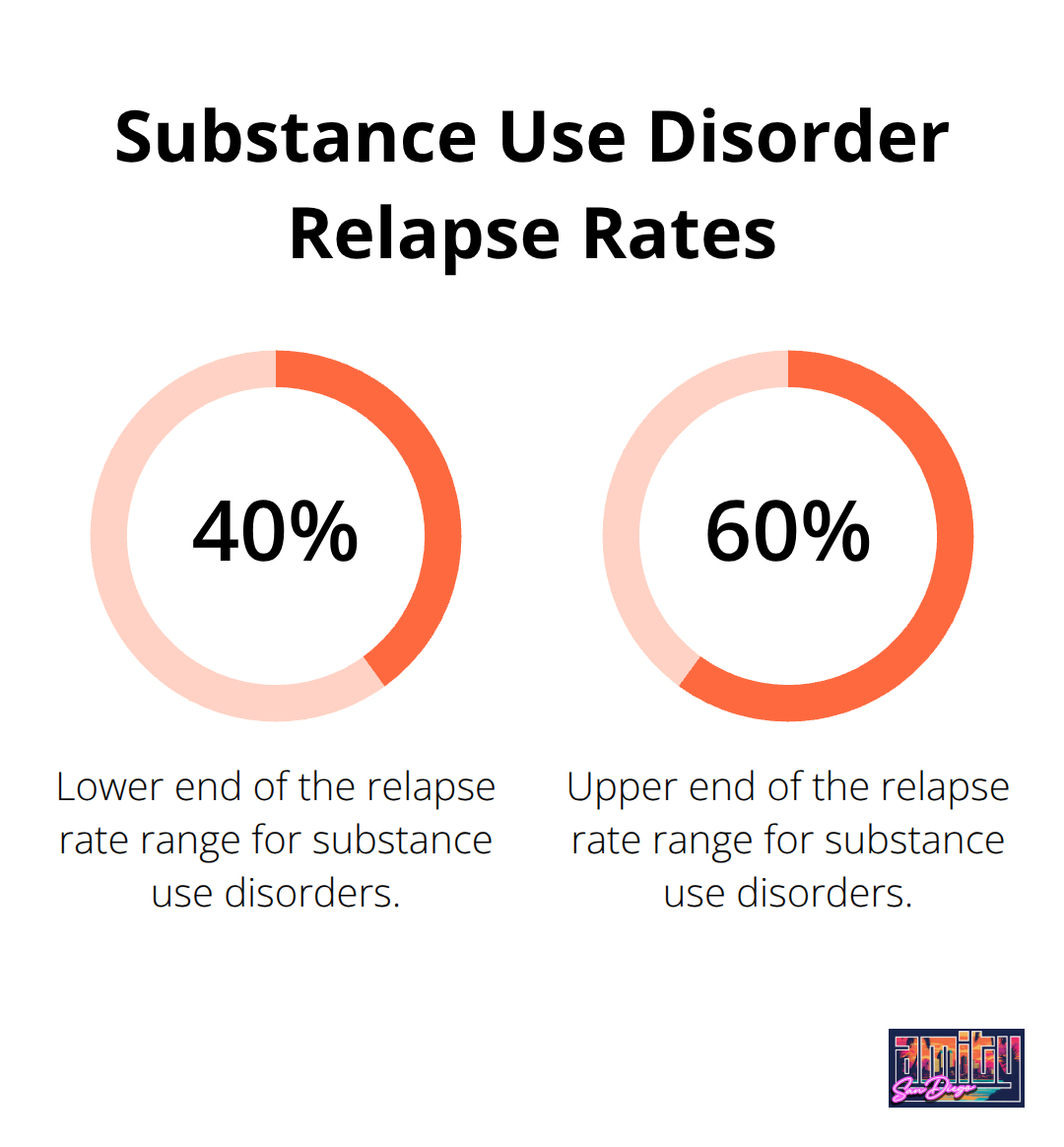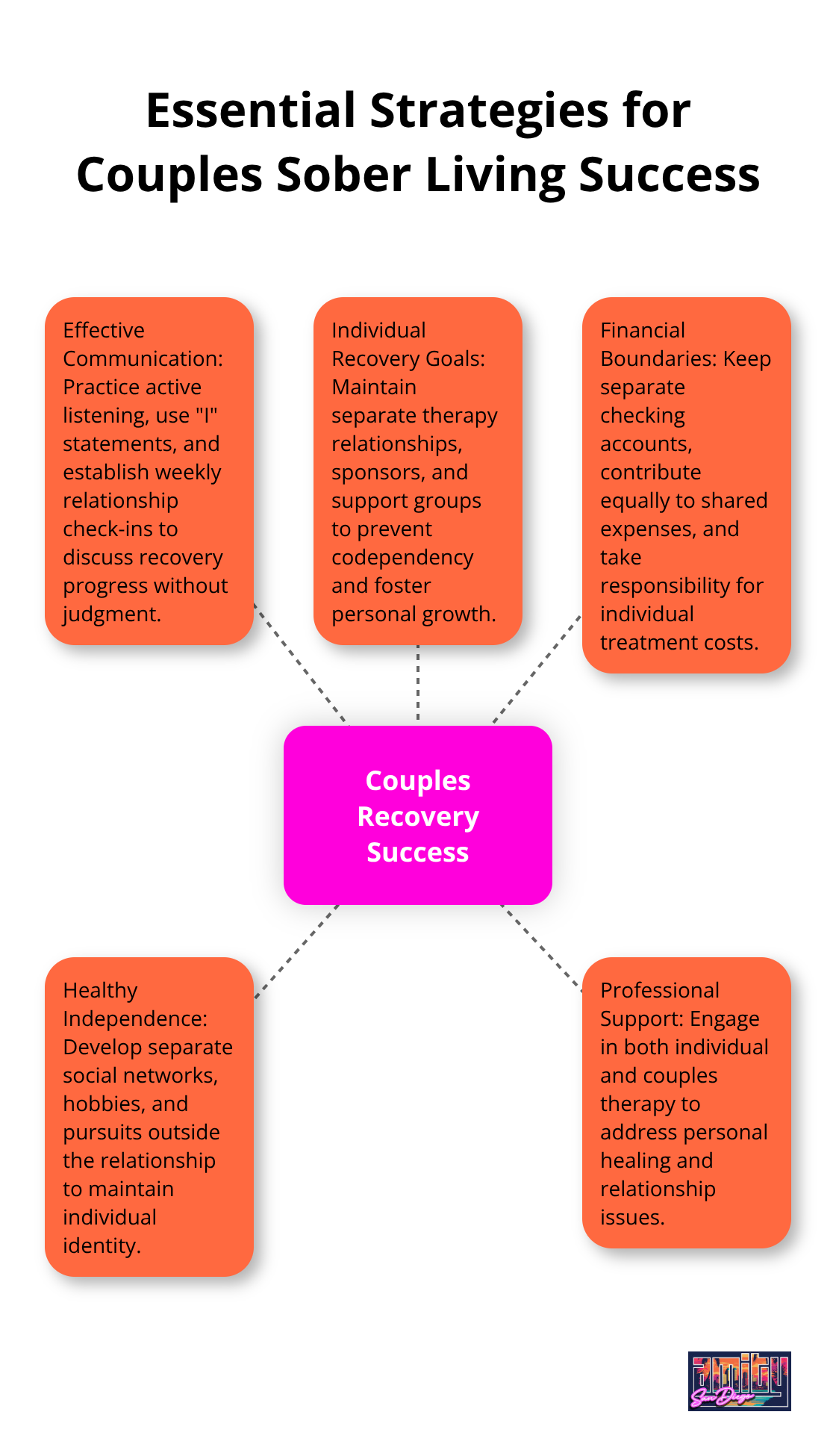Recovery as a couple presents unique opportunities and challenges that individual programs simply can’t address. Couples sober living offers a structured environment where partners can heal together while maintaining their relationship.
At Amity San Diego, we’ve seen how the right approach can strengthen both individual sobriety and relationship bonds. Success requires specific strategies that balance personal growth with partnership dynamics.
What Makes Couples Sober Living Different
Couples sober living programs operate with fundamentally different structures than traditional individual recovery homes. Partners share living space in a controlled environment with specialized rules that address relationship dynamics. Most facilities require both individuals to maintain sobriety before admission, though some programs accept couples directly from detox. The average stay spans 90 to 180 days, significantly longer than individual programs that typically last 60 to 90 days.

Structured Environment for Two
Couples sober living homes enforce stricter boundaries than individual facilities. Both partners must attend mandatory house meetings, maintain employment or education, and follow synchronized curfews. Drug testing occurs weekly for both individuals, with immediate consequences that affect the entire couple. House rules typically prohibit physical intimacy during early recovery, which allows partners to focus on individual healing before they address relationship issues. Most programs require couples therapy sessions twice weekly, individual counseling sessions, and participation in group activities with other residents.
Financial and Eligibility Requirements
Monthly costs for couples sober living vary significantly depending on location and amenities. Both partners must demonstrate financial stability or secure insurance coverage before admission. Programs require medical clearance, psychiatric evaluations, and commitment agreements that both individuals must sign. Background checks eliminate applicants with violent criminal histories or active legal cases. Most facilities mandate that couples complete primary treatment or detox programs before they apply, with documentation from previous treatment providers required for admission approval.
Daily Life and Accountability Measures
Daily schedules in couples programs follow rigid structures that promote accountability between partners. Morning check-ins require both individuals to report their emotional state and recovery goals for the day. Shared chores and responsibilities create interdependence while house managers monitor relationship dynamics during group activities. Evening curfews (typically 9 PM on weekdays, 11 PM on weekends) apply to both partners simultaneously, preventing one person from staying out while the other returns home alone.
These structured elements prepare couples for the communication skills and boundary work they’ll need to master in their recovery journey together.
Benefits and Challenges of Couples Recovery Together
Couples who recover together experience significantly higher success rates when they approach sobriety as a shared mission. Research shows that relapse rates for substance use disorders range from 40-60%, highlighting the importance of strong support systems.

The mutual accountability creates powerful motivation – when one partner considers substance use, the other serves as an immediate reality check. Partners develop identical coping strategies, attend therapy sessions together, and build new social networks simultaneously. This synchronized approach eliminates the common problem where one partner progresses faster than the other, which creates relationship tension. Couples also share the financial burden of recovery costs, making long-term treatment more sustainable than individual programs.
When Shared Recovery Becomes Destructive
Couples recovery fails catastrophically when partners become codependent enablers rather than accountability partners. Early sobriety strips away the substances that previously masked relationship problems, exposing deep communication issues, trust violations, and incompatible life goals. Many women with substance abuse face particular conflicts when they have partners who also struggle with addiction, as documented in family treatment research. Partners often trigger each other’s cravings through familiar behavioral patterns or locations associated with past drug use. Psychologists recognize this domino effect and have built treatment models upon the principle that recovery is rarely sought or carried out in isolation. Financial stress doubles when both partners need treatment simultaneously, and many couples accumulate debt that strains their relationship throughout recovery.
Individual Growth Within Partnership
Successful couples recovery requires each partner to maintain separate therapeutic relationships and personal recovery goals. Partners must attend individual counseling sessions weekly in addition to couples therapy, developing distinct coping mechanisms that don’t depend on their relationship. The most successful couples establish different hobbies, friend groups, and daily routines that support their individual healing process. This independence prevents the relationship from becoming the sole source of recovery motivation, which creates dangerous pressure and unrealistic expectations.
Financial Impact on Recovery Success
The financial burden of couples recovery creates both opportunities and obstacles for long-term success. Shared housing costs in sober living reduce individual expenses by approximately 40%, making extended treatment more affordable. However, couples face doubled therapy costs, with weekly sessions ranging from $200 to $400 per couple. Insurance coverage varies significantly – some plans cover couples therapy while others require separate individual claims. Many couples discover that their combined debt from active addiction exceeds $50,000, requiring financial counseling alongside recovery treatment.
These financial realities directly influence the communication strategies and boundary work that couples must master to maintain both their sobriety and their relationship satisfaction.
Essential Strategies for Success in Couples Sober Living
Effective communication forms the foundation of successful couples recovery, but most partners enter sober living with severely damaged communication patterns from years of addiction-related conflicts. Active listening techniques require daily practice – this means each partner commits to repeat back what they heard before they respond, which eliminates the defensive reactions that destroy productive conversations. Dialectical Behavioral Therapy skills work exceptionally well for couples because both partners learn identical conflict resolution frameworks. The most successful couples establish weekly relationship check-ins where they discuss recovery progress, relationship concerns, and individual goals without judgment or attempts to solve problems immediately.

Communication Skills That Prevent Relapse
Partners must master assertive communication techniques that replace the aggressive or passive patterns that developed during active addiction. Each person learns to express needs clearly without blame language, which reduces the emotional triggers that lead to substance use. Couples practice “I” statements during conflicts instead of accusatory “you” statements that create defensiveness. Weekly communication exercises help partners identify their individual trigger words and phrases that escalate arguments. These structured conversations prevent small issues from escalating into major conflicts that threaten sobriety.
Individual Recovery Goals Within Partnership
Individual recovery goals must remain completely separate from relationship satisfaction to prevent codependency that sabotages long-term sobriety. Each partner needs distinct therapy relationships, different sponsor connections, and separate support group attendance to maintain independent recovery foundations. The healthiest couples spend time apart pursuing individual interests, friendships, and recovery activities (this separation creates space for personal growth while preventing the relationship from becoming the primary recovery motivator). Partners should establish non-negotiable individual boundaries around therapy sessions, personal recovery time, and friendship development.
Financial Boundaries and Shared Accountability
Financial boundaries protect both individual recovery and relationship stability during the vulnerable early sobriety period. Successful couples maintain separate checking accounts while they contribute equally to shared expenses like housing, groceries, and utilities. Each partner takes responsibility for their own treatment costs, therapy fees, and recovery-related expenses to prevent financial resentment. This financial independence eliminates the power dynamics that develop when one partner controls the money or pays for everything. Clear financial agreements prevent arguments about spending priorities and create accountability for both partners to maintain employment or income sources throughout their recovery journey.
Building Healthy Independence
Partners must develop separate social networks and hobbies that don’t revolve around their relationship or shared recovery activities. Each person should cultivate friendships outside the relationship that provide emotional support and social connection. Individual exercise routines, creative pursuits, and career development goals help partners maintain their identity beyond the couple dynamic. This independence prevents the relationship from becoming the sole source of recovery motivation, which creates dangerous pressure and unrealistic expectations when relationship problems inevitably arise.
Final Thoughts
Couples sober living demands careful preparation and honest expectations about the obstacles you will face. Both partners must focus on separate recovery goals while they develop better ways to communicate with each other. The structured environment creates accountability, but success depends on each person’s commitment to heal individually.
Professional support separates couples who succeed in recovery from those who fall into codependent patterns. Licensed therapists guide partners through the difficult relationship issues that surface when substances no longer hide underlying problems. Individual therapy sessions matter as much as couples counseling throughout your recovery process (both types of treatment address different aspects of healing).
The right program selection starts with frank discussions about what works and what fails in your relationship. Look for facilities that provide both individual and couples therapy, enforce strict sobriety standards, and offer clear information about all expenses. We at Amity San Diego recognize that recovery impacts entire families and relationships, which is why our outpatient programs deliver the professional support and proven treatment methods that help couples build lasting sobriety while they maintain strong individual recovery foundations.



